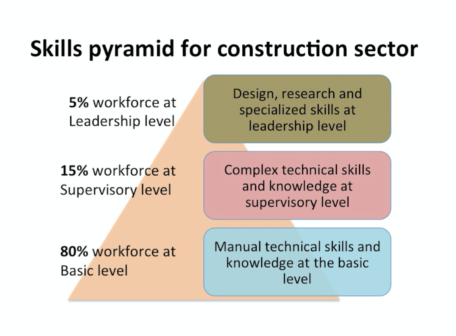Skilling the supervisors: Behavioural and change management skills
Behaviour and attitude are key qualities which add to the success of a project or organization. Addressing and managing people with different behaviours and attitudes is a big challenge. At a construction site, we have people at different levels who contribute to the human element of the team like workers, supervisors and managers.
 Supervisors are the key to the success of any execution. They are the last mile in the delivery at the site. If you don’t have a good and alert supervisor at your site then the chances of timely project execution and bottom-line taking a hit are quite high.
Supervisors are the key to the success of any execution. They are the last mile in the delivery at the site. If you don’t have a good and alert supervisor at your site then the chances of timely project execution and bottom-line taking a hit are quite high.
You always have a problem when your supervisor is not able to interact positively with the Engineers / Construction Managers (those who give him instructions), has conflict with his peers (other supervisors and departments), is not able to motivate or resolve conflict within the team (the workers) he is leading. In a construction site an average supervisor mostly reacts emotionally to the situations. This happens because he doesn’t really know any other way of handling the situation.
As an example, the engineer asks a supervisor to complete a job within an unreasonable timeline. A discussion happens where Supervisor is normally overruled by the engineer and asked to deliver. The Supervisor either resigns to the fact that engineer won’t understand and takes up the job knowing very well he won’t be able to deliver it or has a showdown and walks away. In both cases a data based interaction doesn’t happen. The constraints of the work don’t get discussed and Supervisor and Engineer are not able to come to a consensus.
(Above is the first group the Supervisor interacts with – The management)
A similar situation occurs when a worker takes too many breaks and takes a long time to return to work, or refuses to work due to the heat or other conditions, or just does not work when he is not being watched by the Supervisor.
Another situation of the similar nature is encountered with his peers when a difficult co-worker who gets upset quite easily stops co-operating. Normally these end up loud arguments, intentional delaying of dependent activities, friction within two teams which need to work closely where their work is interdependent. The Company is the ultimate loser in all of the above situations. The problem is that even though the Supervisor wants to resolve each of the above situations, he is not equipped with the right behavioural skills to do so.
( Above is the third group the Supervisor interacts with – The Peers)
So how should the Supervisor handle these interactions? What qualities should he have? How can the organization help him to handle these kind of situations? How do you inculcate a behavioural change to handle all three groups that the supervisor interacts with?
Based on my experience and some successful programs created over the years, I feel an organization can take concrete steps to strengthen the behavioural skills in the supervisor. This should be done over a period of time and should be done with the help of real life examples. The mode can be a combination of group discussions, brainstorming sessions, discussing site issues based on each interaction group and site assignments.
The skill sets required for interacting with each of the groups are the following:
1.Interaction with the team – This is the direct group of workers a supervisor handles. The key skills required to handle this group are
- Motivation
- Resolving Conflicts
- Delegation
- Leadership
2.Interaction with peers – This is the group of people a Supervisor works with. The key skills required to handle this group are
- Team Work
- Ownership of the task
- Coordination skills
3. Interaction with the Management team (Engineers/ Construction Managers) – This is the group who assigns tasks and instructions to the Supervisor. The key skills required to handle this group are
- Effective Communication
- Accountability
(This article is based on a series of LinkedIn posts written by Munish Kumar)














Like!! I blog quite often and I genuinely thank you for your information. The article has truly peaked my interest.